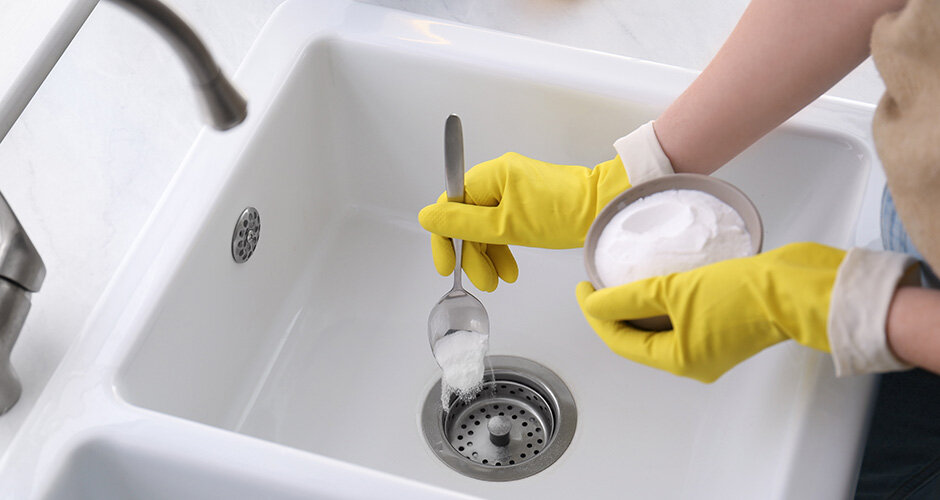A slow-draining sink or a lingering odour in your bathroom can turn a minor inconvenience into a major frustration. Using harsh chemicals might make you hesitate, but a gentler, eco-friendly solution is hiding in your kitchen cupboard. Learning how to clean drains with baking soda is a simple, cost-effective, and natural way to restore the flow in your plumbing.
Baking soda, combined with a few household ingredients, creates a powerful reaction that breaks down clogs, neutralises odours, and leaves your drains smelling fresh. Let’s walk through seven easy steps to clean your drains using baking soda and restore their functionality.
Why Baking Soda Is Effective for Cleaning Drains
Baking soda, or sodium bicarbonate, is a versatile household staple known for neutralising odours, breaking down grease, and dissolving grime. Its natural properties make it a safe alternative to chemical drain cleaners, which can harm pipes and the environment.
When paired with vinegar or hot water, baking soda creates a bubbling action that loosens clogs and washes away debris. It’s particularly effective for removing grease, soap scum, and other organic build-ups that can cause slow drainage.
How to Clean Drains with Baking Soda in 7 Steps
Step 1: Gather Your Materials
Before starting, gather the following items:
- Baking soda (1 cup)
- White vinegar (1 cup)
- Boiling water (2–3 litres)
- A kettle or large pot
- A sink stopper or cloth
- Gloves (optional for sensitive skin)
Having everything ready will make the process smoother and ensure you can work efficiently.
Step 2: Boil Water and Prep the Drain
Begin by boiling 2–3 litres of water. While waiting for the water to heat, remove any visible debris from the drain, such as hair, soap scum, or food particles. Use gloves if needed to protect your hands during this step.
Pour half of the boiling water slowly down the drain. This will help loosen grease and soften debris, making the baking soda more effective.
Step 3: Add Baking Soda
Measure one cup of baking soda and pour it directly into the drain. You may hear a slight fizzing sound as the powder settles. Baking soda is alkaline, which makes it perfect for breaking down acidic build-ups commonly found in drains.
Tip: If your drain opening is small or the baking soda clumps, use a spoon or a funnel to guide it in.
Step 4: Pour in Vinegar
Carefully measure one cup of white vinegar and pour it slowly into the drain. You’ll notice bubbling and fizzing as the vinegar combines with the baking soda. This reaction shows that the mixture is working to break down grime and clogs.
Quickly cover the drain with a sink stopper or cloth to trap the reaction inside. This helps the mixture target blockages deeper within the pipes.
Step 5: Let It Sit
Allow the baking soda and vinegar mixture to sit in the drain for 15–20 minutes. During this time, the reaction will work to dissolve grease, soap scum, and other debris. You may hear occasional fizzing sounds, indicating the mixture is still active.
Use this waiting period to prepare more boiling water for the final flush.
Step 6: Flush with Boiling Water
After 20 minutes, pour the remaining boiling water down the drain to flush out the loosened debris. Pour slowly and steadily to ensure the water reaches all parts of the pipe.
The hot water washes away debris and helps eliminate any lingering odours, leaving your drain fresh and clean.
Step 7: Test Your Drain
Run warm tap water to check if the drain is flowing freely. If it still drains slowly, repeat the process once more. Consider using a plunger after the first round to dislodge remaining debris for particularly stubborn clogs.
If multiple attempts don’t resolve the issue, it’s time to call a professional plumber like our experts at Ezy-Plumb, who can use advanced tools to diagnose and fix the problem.

Benefits of Cleaning Drains with Baking Soda
Using baking soda to clean your drains offers several advantages:
- Eco-Friendly: Baking soda is a natural, non-toxic alternative to harsh chemical cleaners.
- Cost-Effective: It’s an affordable solution that doesn’t require specialised tools or products.
- Gentle on Pipes: Unlike chemical cleaners, baking soda won’t corrode your pipes or harm septic systems.
- Deodorising Properties: Baking soda neutralises odours, leaving your drains smelling fresh.
- Convenient: Most households already have baking soda and vinegar, making it an accessible option.
When to Call a Professional
While baking soda is adequate for routine drain cleaning and minor clogs, it may not resolve severe blockages or recurring issues. Signs that you need professional help include:
- Persistent slow drainage despite repeated cleaning attempts
- Foul odours that don’t go away
- Gurgling sounds in multiple drains
- Water backing up into sinks or tubs
The team at Ezy-Plumb offers expert drain cleaning services and can handle even the most stubborn clogs. Advanced tools like drain cameras and hydro jetting will restore your plumbing system to optimal performance.
Preventing Future Clogs
To keep your drains clean and free-flowing, adopt these preventative measures:
- Use Drain Strainers: Install strainers to catch hair, food particles, and other debris before they enter the drain.
- Avoid Pouring Grease: Dispose of cooking oils and grease in a container rather than down the sink.
- Flush Regularly: Pour boiling water down the drain once a week to prevent build-up.
- Clean Monthly: Regularly use baking soda and vinegar to maintain your drains.
Taking these simple steps can save you time, money, and the hassle of dealing with clogged drains in the future.
Following these seven steps, you can quickly learn how to clean drains with baking soda and keep your plumbing system running smoothly. This natural, eco-friendly method is effective and gentle on your pipes. For more challenging clogs or recurring issues, trust the skilled professionals at Ezy-Plumb to provide expert solutions.
